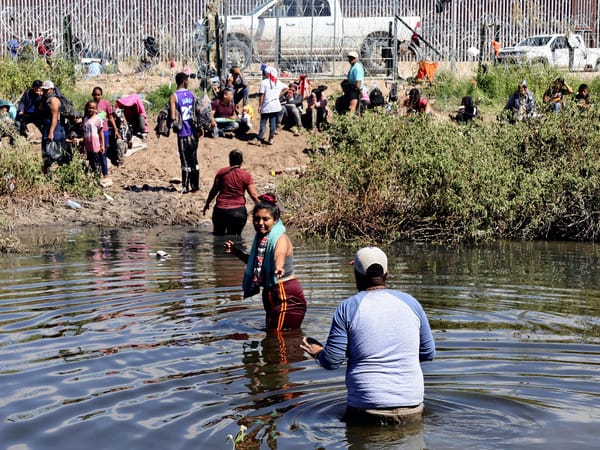The news last week that Texas Attorney General Ken Paxton wants to shut down a Catholic migrant shelter in El Paso struck many as an unjust attack on both migrants and the faith-based groups that assist them. Catholics leaders, especially, were outraged that Paxton would target Annunciation House, which has sheltered migrants for five decades, as part of the state’s escalating efforts to secure the border and crack down against illegal immigration.
On one level, the outrage is understandable. Why go after a Catholic charity that is just trying to help feed and clothe migrant families? Aren’t all Christians called to minister to the poor and welcome the stranger? Isn’t this an attack on religious freedom and vulnerable migrants?
This is the argument deployed by Annunciation House and its high-profile defenders, including the Bishop of El Paso, Mark Seitz. In a statement last week, Seitz denounced what he called “an escalating campaign of intimidation, fear, and dehumanization in the State of Texas” and “the targeting of those who would offer aid as a response of faith.” In the bishop’s telling, Annunciation House is merely acting on a “Catholic commitment to the poor.”
But the outrage is misplaced, and the bishop is wrong. Helping the poor and welcoming the stranger doesn’t mean becoming complicit in what amounts to the largest human-trafficking operation in history, and Texas is well within its rights to scrutinize nonprofits like Annunciation House. The border crisis is sprawling and complex, with many actors—some of them bad ones.
Part of what Paxton is trying to figure out is whether Annunciation House is actively assisting illegal immigration. In a statement last week, Paxton’s office suggested that the shelter might be “facilitating illegal entry to the United States, alien harboring, human smuggling, and operating a stash house.”
The statement was met with predictable incredulity by the press, which framed the story as if the Texas were persecuting Catholics just trying to help the poor, leveling outrageous accusations against them in an attempt to smear anyone who assists migrants as a criminal.
“Every person who crosses the border has been trafficked.”
But that isn’t what’s happening here. The key thing to understand is that every person who crosses the border has been trafficked. Some 10 million illegal aliens haven’t spontaneously entered the United States over the past three years. They are part of a vast, for-profit enterprise, a human pipeline that spans Mexico and much of Central and South America, and continues deep into the United States.
What many Americans don’t realize is that no one crosses the border these days without paying—and often the payments continue long after migrants arrive. The remittances sent abroad aren’t just going to support migrants’ families. Often, they also go to the cartels and cartel-associated smuggling organizations to whom migrants are still heavily indebted. By taking control of illegal immigration and charging every man, woman, and child who wants to cross, and then continuing to charge them after they arrive, the cartels have effectively created a tax base inside the US homeland. The migrants arriving here are frequently debt slaves to the criminal networks they relied on to get in.
That’s one reason why shelters like Annunciation House, which have received millions in taxpayer funding from the Biden administration, have rightly attracted the attention of the Texas attorney general’s office. These shelters, after all, don’t just give migrants food and a place to sleep for a few nights. They also effectively serve as hubs for the illegal immigration black market. When migrants arrive at a place like Annunciation House, they are often given assistance obtaining bus or plane tickets, making contact with employers or extended networks across the United States, and frequently provided the means to get to their destination.
Many migrants are highly motivated to get where they are going as soon as possible, because they need to start working so they can send payments—not just to their families back home, but to the cartels that know the identities and whereabouts of their families. The cartels have developed sophisticated ways of gathering and verifying information on migrants who pass through their territory, and often demand additional payments once migrants get to the United States and start earning higher wages.
Inside Mexico, those who can’t pay, who might have run out of funds by the time they reach northern Mexico, are often held in stash houses until funds can be extracted from family members back home. This is common in Mexican border towns, where not just local law enforcement, but also the National Guard and federal immigration officials are part of the human-trafficking pipeline. These debts, whether incurred by the migrant or their family, must be paid. One of the horrifying realities of the border is that payment is often extracted, in kind, from women and girls, who are routinely raped by smugglers and cartel associates.
But sexual assault in Mexico isn’t the only danger migrants face. Some, after arriving in the United States, aren’t just debt slaves, but actually forced to work as part of an arrangement to keep their families safe. To the extent places such as Annunciation House are functioning as stash houses—that is, places where migrants must stay until they’re able to pay what they owe or until travel arrangements can be made—they are advancing the work of criminal organizations, however inadvertently.
And make no mistake: These criminal networks are operating throughout the United States. From drivers who pick up migrants outside Texas border towns and transport them past inland Border Patrol checkpoints to employers across the country who hire migrant labor at slave wages, the crisis isn’t confined to the border. It is a system built on coercion, exploitation, and violence. And even well-meaning Catholics at shelters like Annunciation House can end up acting as a part of that system by assisting migrants making illegal crossings. There is nothing compassionate, much less Christian, about helping to ensure the smugglers’ smooth operations.
